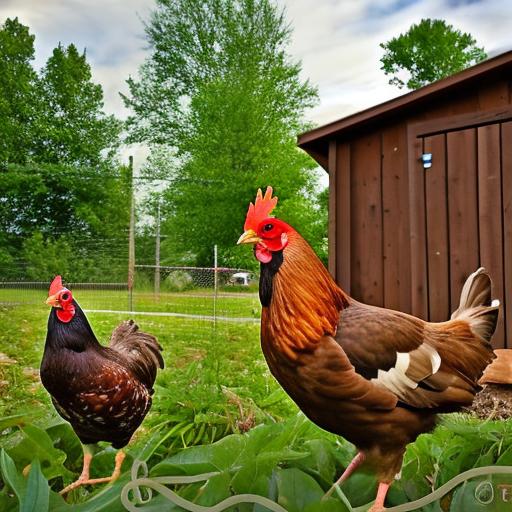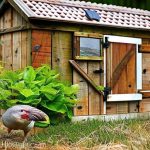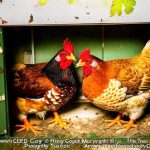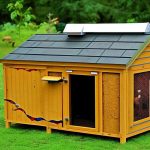Raising chickens has become increasingly popular in recent years, and for good reason. Not only do chickens provide fresh eggs, but they also make great pets and can even help with pest control in your garden. However, in order to ensure that your chickens are happy and healthy, it is important to maintain a clean and well-maintained chicken coop.
The environment in which your hens live plays a crucial role in their overall well-being. A clean and comfortable coop promotes good health, reduces stress, and encourages natural behaviors. By taking the time to properly maintain your chicken coop, you are not only ensuring the happiness of your hens but also maximizing their egg production.
Choosing the Right Location for Your Muskegon Chicken Coop
When it comes to choosing the location for your chicken coop in Muskegon, there are several factors to consider. First and foremost, you want to select a spot that provides adequate sunlight and shade throughout the day. Chickens need sunlight for vitamin D production and overall health, but they also need access to shade to protect them from extreme heat.
Another important consideration is the proximity of your coop to your house. You want to choose a location that is convenient for you to access daily for feeding, cleaning, and collecting eggs. Additionally, consider the noise factor. Chickens can be noisy creatures, so you may want to place your coop away from neighbors’ windows or living areas.
Designing and Building a Coop that Promotes Hen Happiness
The design and construction of your chicken coop are crucial for promoting hen happiness. A well-designed coop will provide adequate space for your hens to move around comfortably, as well as separate areas for nesting and roosting.
When building your coop, it is important to use high-quality materials that are durable and easy to clean. Consider using materials such as pressure-treated lumber for the frame and wire mesh for the walls and windows. This will help to keep predators out while allowing for proper ventilation.
Additionally, make sure to include features such as windows and vents to allow for natural light and airflow. This will help to regulate temperature and prevent the buildup of moisture, which can lead to mold and disease.
Maintaining a Clean and Healthy Environment for Your Hens
Maintaining a clean and healthy environment is essential for preventing disease and promoting the overall well-being of your hens. Regular cleaning of the coop is necessary to remove droppings, feathers, and other debris that can harbor bacteria and parasites.
Start by removing any soiled bedding or litter from the coop on a daily basis. Replace it with fresh bedding to keep your hens comfortable and prevent the buildup of ammonia from their waste.
Every few weeks, thoroughly clean the coop by removing all bedding, scrubbing surfaces with a mild detergent, and rinsing with clean water. Allow the coop to dry completely before adding fresh bedding.
Feeding Your Hens a Balanced and Nutritious Diet
A balanced diet is essential for your hens’ health and egg production. Chickens require a diet that is high in protein, vitamins, and minerals. A good quality commercial chicken feed should be the main component of their diet.
In addition to commercial feed, it is important to provide your hens with fresh fruits and vegetables as well as access to grit for digestion. You can also supplement their diet with kitchen scraps such as leftover fruits, vegetables, and grains.
Make sure to provide your hens with clean water at all times. Water is essential for digestion, egg production, and overall health. Change their water daily to ensure freshness.
Providing Adequate Space for Your Hens to Roam and Play
Providing adequate space for your hens to roam and play is crucial for their physical and mental health. Chickens are naturally curious and active animals, and they need space to explore, scratch, and dust bathe.
The general rule of thumb is to provide at least 4 square feet of space per chicken in the coop and at least 10 square feet per chicken in the outdoor run. However, more space is always better.
If possible, allow your hens to free-range in a secure area of your yard. This will give them access to fresh grass, insects, and other natural food sources. Just make sure to supervise them to protect them from predators.
Protecting Your Hens from Predators and Other Hazards
Protecting your hens from predators and other hazards is essential for their safety and well-being. Common predators include raccoons, foxes, coyotes, and even neighborhood dogs.
To keep predators out, make sure your coop is securely built with sturdy materials. Install hardware cloth or wire mesh around the coop and run to prevent predators from digging under or climbing over.
Additionally, make sure to lock up your coop securely at night to protect your hens from nocturnal predators. Consider installing motion-activated lights or alarms to deter predators.
Ensuring Proper Ventilation and Temperature Control in Your Coop
Proper ventilation is crucial for maintaining a comfortable and healthy environment for your hens. Good airflow helps to remove moisture, ammonia, and odors from the coop, which can lead to respiratory issues if left unchecked.
Make sure your coop has windows or vents that can be opened and closed as needed. This will allow for fresh air circulation in the summer while preventing drafts in the winter.
Temperature control is also important for your hens’ well-being. Chickens are sensitive to extreme temperatures, so it is important to provide insulation in the coop to keep them warm in the winter and cool in the summer.
Keeping Your Hens Safe and Comfortable during Extreme Weather Conditions
Extreme weather conditions can pose a threat to your hens’ health and safety. During hot weather, make sure to provide shade and access to fresh water at all times. Consider using fans or misters to help cool down the coop.
In cold weather, provide insulation in the coop to keep your hens warm. Use straw or wood shavings as bedding to provide extra warmth. You can also use heat lamps or heated waterers to prevent freezing.
During storms, make sure your coop is secure and protected from strong winds and heavy rain. Check for any leaks or damage that could compromise the safety of your hens.
Regular Health Checks and Medical Care for Your Hens
Regular health checks and medical care are essential for keeping your hens healthy and happy. Inspect your hens regularly for signs of illness or injury, such as changes in behavior, loss of appetite, or abnormal droppings.
If you notice any signs of illness, consult a veterinarian who specializes in poultry health. They can provide guidance on treatment options and preventive measures.
Additionally, make sure to provide your hens with regular vaccinations and deworming treatments as recommended by your veterinarian. This will help to prevent common diseases and parasites.
Happy Hens, Happy Life – Tips for Maintaining a Successful Chicken Coop in Muskegon
Maintaining a healthy and happy environment for your hens is essential for their overall well-being and egg production. By choosing the right location, designing a well-built coop, providing a balanced diet, ensuring adequate space, protecting from predators and hazards, maintaining proper ventilation and temperature control, keeping them safe during extreme weather conditions, and providing regular health checks and medical care, you can create a successful chicken coop in Muskegon.
Remember that happy hens lead to happy lives. By taking the time to properly care for your chickens, you will not only enjoy fresh eggs but also the joy and companionship that comes with raising these wonderful creatures. So, roll up your sleeves, put on your gardening gloves, and get ready to create a happy and healthy home for your hens in Muskegon.
Meet Walter, the feathered-friend fanatic of Florida! Nestled in the sunshine state, Walter struts through life with his feathered companions, clucking his way to happiness. With a coop that’s fancier than a five-star hotel, he’s the Don Juan of the chicken world. When he’s not teaching his hens to do the cha-cha, you’ll find him in a heated debate with his prized rooster, Sir Clucks-a-Lot. Walter’s poultry passion is no yolk; he’s the sunny-side-up guy you never knew you needed in your flock of friends!







